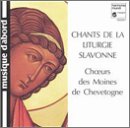| All Artists: Choeur des Moines Bénédictins de l'Union, Dom Gregoire Bainbridge Title: Chants De La Liturgie Slavonne Members Wishing: 1 Total Copies: 0 Label: Harmonia Mundi Fr. Release Date: 2/12/1992 Album Type: Import Genres: Classical, Christian & Gospel Style: Number of Discs: 1 SwapaCD Credits: 1 UPCs: 093046056728, 3149025038203 |
Search - Choeur des Moines Bénédictins de l'Union, Dom Gregoire Bainbridge :: Chants De La Liturgie Slavonne
 | Choeur des Moines Bénédictins de l'Union, Dom Gregoire Bainbridge Chants De La Liturgie Slavonne Genres: Classical, Christian & Gospel
|
Larger Image |
CD Details |
CD ReviewsExtraordinary music A. G. Plumb | Melbourne, Australia | 05/03/2002 (5 out of 5 stars) "I especially like the first item on this CD but it ia all enjoyable. The wonderfully spiritual singing in the first piece is exceptional. It has a characteristic that I can hardly think of another similar example - it is superbly relaxed. As if singing is so natural, so easy to achieve.This CD is rather short (47 minutes) and sometimes the audio is not as pure as it could be, but I wouldn't be without it. Have a listen to the samples provided and I suspect you will agree with me if you like choral music and/or religious music." Our Christian God can have so many colors Jacques COULARDEAU | OLLIERGUES France | 06/28/2008 (5 out of 5 stars) ""Heirmi of the Canon" is a surprising - for us Western Christians, if we are Christians - form of evocation of God. The contrast between the tenor voice and the bass, deep bass creates a conflictual sound landscape that becomes an architecture of the soul. The tenors sing the beauty of God, of the mission Moses and so many other prophets got on earth, and the deep bass - and the deeper the more so - reveals the power of God that inspired the prophets in their words as much as in their deeds. The two together reflect our own position confronted to the truth of the prophecy and the demanding strength of God. Then the tyrant's impious provocations and Daniel's enigma solving power are little since they are God's plan, and yet a lot for the very same reason, to make God's people react, reach up to the sky. The tyrant is needed to provoke and justify the prophet's answer and lead. Then the coming of Christ and his sacrifice in Jerusalem is the utmost example of God's design of universal life and man's fate. The Beatitudes of Saint Matthew evoke the slow rising, and the constant desire of the soul to rise, to the life that is suspended in mid-heavens by our connection to the cross, to that elevation in a suffering that is transfixed and transfigured. All musical sentences end like that, suspended in mid tone, mid scale, mid harmony. And that rising desire knocks on the door, beg for being heard, satisfied, accepted, welcomed into that kingdom of God. The praying priest from the heart of the nave, reverberating into the infinity of its vault finds its earth in the chorus that sounds solid, full, ecstatically serene. That was the great prokeimenon. Then smaller pieces will amplify this search for serenity in contemplation, fullness in communion. The prayer to our father finds the deep bass as the voice of that father anew. The troparion goes in a completely different direction. The music is opening its arms to remain directed towards the world welcoming and greeting people who need us, our prayers, our alms. The Acachist hymn is another story. Dedicated to the victorious general of our armies, hence to God himself, it is a laudative lament that has to praise the victory and mourn the dead, those that were lost along the way and it becomes a dirge at times since it is so deep, so slow, so vast and sad in its never ending accents. The great canon of saint Andrew of Crete amplifies the dirge by lifting it up slightly skyward though this soaring tenor voice is pushing its roots in the deep soil of the bass. That can only lead and open to the glorification of the father. And the Sticharion reconstructs the equilibrium of voices, of aspiring and contemplative tendencies, of the light of glory that dresses the suffering of the body into one single salvation movement. That creates such a thick flesh of satisfaction and submission that we can believe in the happiness of the faith in the father of humanity. We can then enter the offertory chant of Easter-eve, the bread as the flesh of Jesus, of God, and the wine as the exhilarating blood of the Christ dripping from his cross of salvation, from the chalice of God. Jesus is entering Jerusalem, the bass sustaining and supporting the mission, the tenors glorifying the sacrifice in the face of the Jerusalem and the Temple he was going to change forever. We feel in that surging power and force the destruction of the Temple programmed - by God - for 70 CE. Dr Jacques COULARDEAU, University Paris Dauphine, University Paris 1 Pantheon Sorbonne & University Versailles Saint Quentin en Yvelines " An enchanting collection Sean P. Doyle | Edmonds, WA USA | 01/19/2003 (5 out of 5 stars) "This is an excellent, if small, collection of Eastern Liturgical chants in Church Slavonic. It contains a nice selection of hymns from the Orthodox Divine Liturgy beautifully performed in their simple splendor. Every one is a gem!"
|

 Track Listings (9) - Disc #1
Track Listings (9) - Disc #1